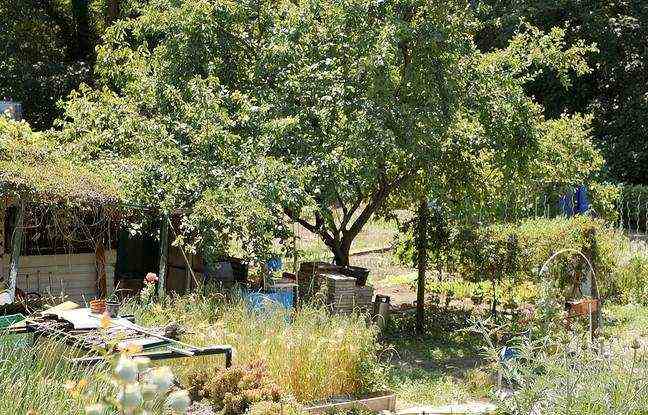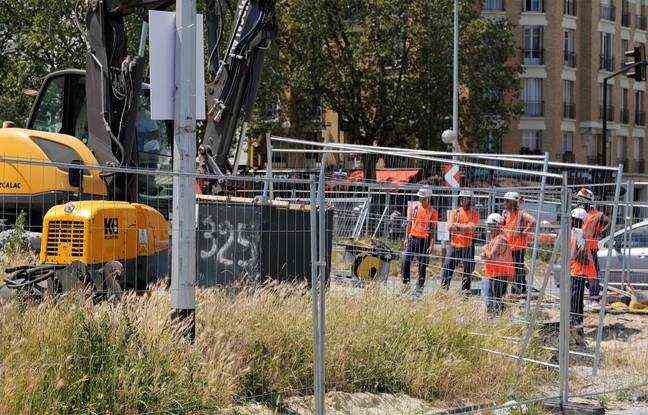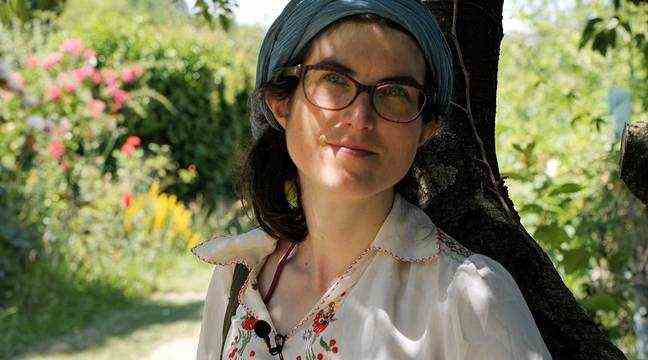The first thing that struck me was the feeling of freshness. The appointment for the interview was set for June 9, 2021, and the weather forecast was around 35 ° in Aubervilliers. When exiting the metro, at Fort d’Aubervilliers station on line 7, you reach the slab of a bus station at the corner of Nationale 2 and avenue de la Division Leclerc. It is 11 o’clock, and at this time of year the sun is already high. The few people who are waiting are gathered in the shade of the booth of the bus drivers. I wonder why I didn’t think about my cap.
My meeting point is less than 100 meters away: at the Jardins Ouvriers des Vertus. When I push the small gate and find myself surrounded by greenery, the temperature difference immediately surprises me. The air just seems more breathable. “This is what scientists call evapotranspiration,” Viviane Griveau-Genest explains to me. “One tree is five air conditioners”.
Refuge in the face of hot weather episodes
Gardening for her is first and foremost a family passion. Her mother and one of her uncles graduated from theBreuil School (the school of horticulture of the city of Paris). It is then a bookish culture that she forged during her studies in Paris when she was far from the plants of tomatoes, lettuce and other cucurbits. Having become a researcher, specialist in medieval literature and a teacher, she moved to Aubervilliers in 2018.
Shortly after the birth of her daughter the heat wave arrives. And to Aubervilliers, “One of the most concrete cities in France”, “we saw it very, very badly”. She ended up in the emergency room for severe dehydration. With her husband, she sets out in search of a corner of greenery and stumbles upon the Virtues. In February 2020, she received from the Association de la Société des Jardins Ouvriers des Vertus the right to exploit a plot. Her 200 m2 of greenery becomes a laboratory where she puts into practice all her theoretical knowledge, and also a refuge in the face of episodes of high heat.

“This project, at the environmental level, it is badly done”
But the following April, he was asked to leave his plot. This is part of an area of the Gardens that will disappear in favor of an Olympic swimming pool for the training of athletes for the 2024 Olympics. Viviane Griveau-Genest is not against the construction of a swimming pool – the city lack of aquatic equipment for school children – but she does not understand why it has to encroach on the Gardens. And then, “this project, at the environmental level, it is badly done, I say it rough of stripping”. Belonging to the collective
Save the allotment gardens of Aubervilliers along with other gardeners and planters, she offers an alternative made with the help of an architect, but preliminary work has already started, and she finds herself under threat of eviction.
Grand Paris Development (GPA), owner of the swimming pool, also has other projects for the Vertus: a station for the future
Grand Paris Express line 15. Again, some plots should be removed. These deletions will be compensated thanks to the wastelands of Fort d’Aubervilliers, but “it is a compensation that the collective disputes. The real compensation is to green a place that was concrete. It is not to replace green on green. Otherwise, it means that in the end, there is less green. It’s mathematical ”. “The only idea these people have is: ‘we’re going to build, we’re going to add more concrete'”.

“Living with green is much better”
When visiting the heart of the Gardens, as if shrouded in green, you can hardly hear the sounds of the city. It’s over 30 °, but in this vegetal cocoon, you feel protected. At a time of climate change and repeated episodes of high heat, the prospect of a reduction in green spaces is proving problematic. For Viviane, this problem has a name: “Unbridled capitalism which optimizes all spaces. Because unbridled town planning is a side of capitalism. “
While waiting for a possible intervention of the police, the collective Sauvons les jardins ouvriers d’Aubervilliers has decided to “open” the Virtues: to schools, by organizing educational visits, to the general public, by setting up collective plots. In the cool, in the shade of a tree, Viviane dreams that the Virtues will become “a third place of urban agriculture with different gardening formats (individual, shared, collective), with workshops on dye plants, medicinal plants. . A place where one would learn the gestures of the culture, with fruit trees on the common alleys
to glean, where we would develop low tech and take advantage of solar energy, etc. »A real laboratory for a city in transition. “Living with green is much better”.

